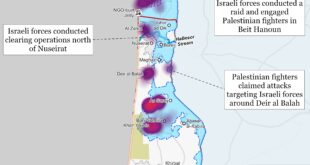 DAMASCUS – A score of young Iraqi women in tight, shimmering gowns shuffle across the nightclub dance floor under the hungry eyes of Gulf Arabs at nearby tables.
DAMASCUS – A score of young Iraqi women in tight, shimmering gowns shuffle across the nightclub dance floor under the hungry eyes of Gulf Arabs at nearby tables.
The band blasts out Iraqi songs into the early hours as the watching youths join the dancing or summon girls to sit with them — there is little pretence about what gets transacted at this neon-lit nightspot half an hour’s drive north of Damascus.
The dancers, some in their early teens, do not want to talk, but one said she had no other way to support her family. “My father was killed in Baghdad and our money is finished,” muttered the dark-haired girl in a black and silver dress.
The United Nations refugee agency UNHCR calls it “survival sex”, a desperate way to cope for Iraqi refugees whose savings have run out since they escaped the violence at home.
The idea repels many of the 1.5 million Iraqis in Syria, but the struggle to make ends meet has forced some to share tiny apartments with other families in the slums of Damascus, put their children out to work or marry off teenaged daughters.
Sometimes such early marriages are simply a cover for prostitution as young brides are swiftly trafficked, according to Hana Ibrahim, head of the Iraqi Women’s Will Association.
She also cited a growing incidence of temporary marriage, accepted in Shi’ite Muslim tradition, as another common route into the sex trade. “Mut’a (temporary) marriage is just for Shi’ites, but who said the Sunnis don’t have other ways?”
UNHCR representative Laurens Jolles said survival sex was directly proportional to general refugee impoverishment.
“We are more and more confronted with examples of young girls or women who have decided on their own or through their families to get involved in night clubs to supplement the family income or just to look after their children,” Jolles added.
Some end up in Syrian detention. Those who get out are often bailed out by their exploiters and returned to the streets.
Impoverishment is also the main factor driving refugees to return home — about 1,500 a day are crossing back into Iraq, compared to up to 500 daily arrivals, the UNHCR says.
A survey in November showed 46 percent were returning due to financial hardship and 26 percent because their visas had run out — Syria has recently tightened entry and residence rules.
STRUGGLE FOR DIGNITY
But among the myriad Iraqi refugee families who have sunk into poverty are many determined to get by without dishonor.
“We don’t think of our future, only of our children’s future,” said Rukkaya Fadhil, a 34-year-old woman in a green headscarf who keeps smiling despite the grim reality around her.
She has to care for her husband Fallah Jaheel, paralyzed from the waist down after being shot several times in his mobile telephone shop in Babil, south of Baghdad, three years ago.
The couple sold their house to pay for Jaheel’s first seven months in hospital and eventually fled to Syria with their two children, aged 11 and 7. They have lived for a year in the poor Damascus district of Sayyida Zeinab, crowded with Iraqis.
Their savings gone, they depend on charity and whatever help they can get from foreign relief agencies, hoping they will one day be given funds to go abroad so that Jaheel can get advanced treatment for his paralysis — and perhaps walk again.
The UNHCR and partner agencies are handing out food and cash to the neediest Iraqi refugee families they can identify.
They plan to give food packages to at least 200,000 people in the next two months, compared to 51,000 now. About 7,000 families will be getting $100 a month by the end of December.
Bushra, 39, who would not give her family name, sometimes despairs at the indignities of life as a refugee and the struggle to look after her family in a foreign land.
Her troubles began, she explains, when her three brothers were killed at the behest of Iraq’s former leader Saddam Hussein. That prompted her husband to leave her, and the wives of the two married brothers to abandon their children.
Bushra was left to care for nine children, only one of them her own, as well as her ailing mother. One of the boys was killed by Shi’ite militia in Iraq. Sufyan, the oldest at 21, was tortured and cannot work. He sits staring at the television.
“I’m so tired, God, I’m tired,” the usually feisty Bushra wept in the damp, unheated room where the family sleeps. “What’s this life? We knew no life under Saddam and no life after him.”
Her mother, a black scarf around her face, recalled their once-comfortable life in Baghdad, saying their flat in Damascus would have fitted into a corridor of the villa they once owned.
“Just take me back to Iraq so I can die there,” she pleaded.
Bushra, who has worked in Iraq as a photographer and a hairdresser, cannot find a job in Damascus — officially Iraqi refugees are not allowed to work in Syria. One grown-up son is a casual laborer on building sites, earning about $3 a day.
Somehow Bushra has held her family together, but it is easy to see how refugees in similar straits might send their children to work or beg, or cast aside social and religious taboos and push their womenfolk into night clubs or dubious marriages.
 Eurasia Press & News
Eurasia Press & News



